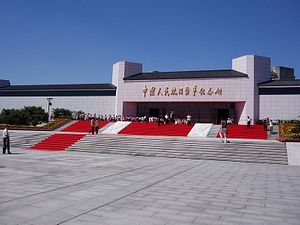July 7, 1937 was the date of the Marco Polo Bridge Incident, a battle between the Chinese and Japanese armies that is used as the official marker of the war between China and Japan. On the 77th anniversary of the Marco Polo Bridge Incident, Chinese President Xi Jinping spoke at a commemoration ceremony in Beijing, outside the Museum of the Chinese People’s War of Resistance Against Japanese Aggression. Xi’s remarks reflected the modern-day tensions between China and Japan.
World War II-era commemorations have gained in importance for China as tensions between Beijing and Tokyo have grown. Earlier this year, China approved two new national holidays to mark the date of the Nanjing massacre and Japan’s surrender. The high-profile nature of this year’s July 7 ceremony also speaks to growing Chinese unease with modern-day Japan.
During his remarks, Xi gave a spirited warning to Japan: “Anyone who intends to deny, distort or beautify the history of aggression will never be tolerated by Chinese people and people of all other countries.” Xi blamed “a small minority of people” who seek to deny history for stoking modern-day regional tensions and undermining regional trust. An opinion piece in People’s Daily touched on similar themes, saying that the “historic tragedy is absolutely not permitted to play out again.” The piece said that the July 7 commemoration ceremony was designed to “respect and protect the authenticity and solemnity of history.”
In addition to denouncing Japan, Xi also had high praise for the Chinese who fought in what is known as the “War of Resistance Against Japanese Aggression.” He noted that the threat posed by Japan caused “all ethnic groups, classes, parties, social organizations and patriots from all circles, as well as Hong Kong, Macao and Taiwan compatriots and overseas Chinese, to unite and throw themselves into a grand struggle which meant life and death for the Chinese nation.”
There obvious parallels with modern China, where nationalism and anti-Japanese sentiment are carefully stoked by the CCP to promote national unity. By focusing on the legacy of World War II, Xi hopes to once again unite all China’s ethnic groups and social classes, including “compatriots” in Hong Kong and Taiwan, who have recently been less than enthused about their relationships with Beijing. People’s Daily envisioned the commemoration ceremony as a way of showing off and celebrating the “national spirit” of the Chinese people.
The Sino-Japanese war has long served as a touchstone for China’s domestic messaging; according to CCP rhetoric, it marks the final stage of China’s “100 years of national humiliation” as well as the rise of “new China” under CCP leadership. Thus emphasizing wartime atrocities is a way to legitimize the CCP — as the People’s Daily piece put it, China was able to overcome the legacy of national humiliation because the Party has made China strong.
Yet increasingly, China is tying the war against Japan into international rhetoric. The People’s Daily article described the war against Japan as one battle in the global fight against fascism. Xi also echoed the common Chinese rhetoric that all peace-loving people should join together to oppose historical revisionism by Japan. Through such remarks, China is attempting to isolate Japan diplomatically while shoring up its own image as a force for regional peace and stability.
Thus, the commemoration ceremony also has international implications, as China continues to use wartime history as a framework for its relationship with other countries. In particular, during Xi’s visit to Seoul last week, he focused on the bond formed between the two countries by their struggle to resist Japanese invasion. Xi and South Korean President Park Geun-hye joined together to express concern about Japan’s reinterpretation of its pacifist constitution. “China and South Korea have similar experience in history and shared interest on the issue of history related to Japan,” Xi said, according to Reuters.
It’s also no coincidence that Angela Merkel, Chancellor of Germany, was in Beijing for a visit Monday. While China steered clear of drawing direct parallels between Japan and Germany (as Berlin has previously complained about such rhetoric) , there was an obvious historical message to Xi Jinping castigating Japan even while Li Keqiang praised China and Germany’s commitment to “safeguarding world peace.” Li also made sure to refer to the Marco Polo Bridge Incident in remarks with Merkel, emphasizing the importance of “remember[ing] history correctly.”
































